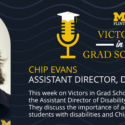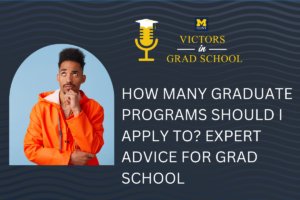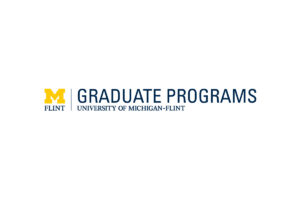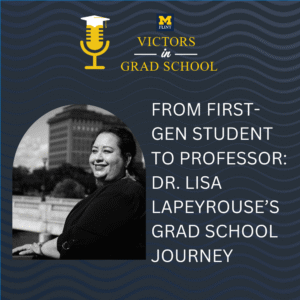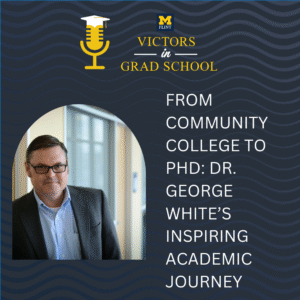Welcome to the Victors in Grad School podcast, this week we interview Chip Evans, the Assistant Director of Disability Services at the University of Michigan-Flint. We explore Chip’s own graduate school journey, discuss accommodations for graduate students with disabilities, and offer valuable insights on succeeding in graduate education.
Chip Evans starts by emphasizing the importance of embracing each student’s unique journey in graduate school. The goal is success, and there are various ways to achieve it, with the right preparation.
The podcast is structured to feature guests who share their own graduate school experiences and resources to help listeners navigate their academic journeys. Chip Evans, as an Assistant Director of Disability Services, provides valuable insights into the accommodations available for students with disabilities in graduate programs.
Dr. Lewis and Chip delve into Chip’s own journey, starting with his background in computer information systems during his undergraduate degree. He shares how working on campus as an undergraduate student, especially as a tutor, sparked his interest in higher education. This eventually led him to pursue a graduate degree in educational leadership, which opened doors to various roles in higher education, including disability services.
Chip’s transition from in-person undergraduate programs to an entirely online format for his graduate studies is highlighted. The key adjustment for him was effective time management due to the flexibility and self-paced nature of online education.
The conversation then focuses on how Chip’s graduate degree prepared him for his current role. The program provided him with a broader understanding of higher education, faculty evaluation, budgeting, and the inner workings of institutions, enabling him to communicate effectively with university leadership.
A significant portion of the episode is dedicated to discussing disability services in graduate education. Chip points out that, for the most part, the services offered to graduate and undergraduate students are quite similar, particularly concerning testing accommodations, note-taking assistance, and accessible materials. The discussion also addresses the stigmas and misconceptions surrounding disability services.
Chip highlights the need for open conversations and breaking the stigma around disabilities. The podcast suggests that disabilities should be seen as neutral and not as something that makes someone less capable. Education should be accessible to everyone.
The episode provides advice for students pursuing graduate education, emphasizing the importance of knowing and utilizing available resources, even if you don’t require accommodations. It’s crucial to understand that seeking assistance when needed is not a sign of weakness. Graduate programs are challenging, and it’s okay to ask for help and support.
The podcast wraps up by mentioning the diverse graduate programs offered by the University of Michigan Flint and encourages students to explore their educational options. Dr. Lewis reminds listeners that they’re on the journey to become “Victors in Grad School” and that he looks forward to accompanying them through their graduate school experiences.
This episode of “Victors in Grad School” provides valuable insights into graduate school experiences, the accommodations available for students with disabilities, and the importance of open dialogue and eliminating stigmas surrounding disabilities in higher education. Chip Evans’ own journey is an inspiring example of how one can find success in graduate school.
This podcast is brought to you by The Office of Graduate programs at the University of Michigan-Flint. If you’re still wondering about other things to consider when it comes to graduate school, you can also contact the Office of Graduate Programs at UM-Flint. We’re here to answer questions Monday – Friday from 8:00 a.m. to 5:00 p.m. EST. You can also find out more about the 50+ programs that the university has to offer here.
TRANSCRIPT
Christopher Lewis [00:00:02]:
Welcome to the Victors in Grad School, where we have conversations with students, alumni and experts about what it takes to find success in graduate school.
Christopher Lewis
Welcome back to Victors in grad school. I’m your host, dr. Christopher Lewis, director of Graduate Programs at the University of Michigan, Flint. Really excited to have you back again this week. And as always, every week, I love being able to sit down with you, to work with you, to talk with you about the journey that you’re on, because every person’s journey is just a little bit different. And it’s important to be able to look at this no matter where you are in the journey, to be able to identify things that you can do right from the get go, to prepare yourself to be successful throughout graduate school. All of us want to be successful. All of us want that experience in grad school where you’re going to be successful and there’s lots of different things that you can do to be able to do just that.
Christopher Lewis [00:01:00]:
This podcast has been set up so that every week I bring on great guests, people that have had different experiences themselves in their own graduate experiences. But beyond that, many of them have resources or other things that they can share with you to be able to help you in this journey that you’re on this week. We’ve got another great guest with us today. Chip Evans is with us today and he’s the Assistant Director of Disability Services at the University of Michigan Flint. We’re going to be talking to him about his own graduate school journey, but also about some of the things that you may need to think about, especially if you may need some accommodation during graduate school and also things that people might forget about as they’re thinking about graduate school as well. Chip, thanks so much for being here today.
Chip Evans [00:01:48]:
Thank you, Chris. Thanks for having me. I appreciate you giving me some time to talk about this important topic and I’d like to share everything I can.
Christopher Lewis [00:01:55]:
I really appreciate you being here. And I think first and foremost, I’d love to learn a little more about your own graduate school experience, because I know you did your undergraduate and graduate degrees at Baker College, and at some point you went through you got your bachelor’s degree in computer information systems. And at some point during that journey, you decided, I need to go further. I want to go further. What was it that made you decide that you wanted to go to graduate school?
Chip Evans [00:02:22]:
So for me it was my career path. When I was an undergraduate student, I worked on campus as a student worker. I was a tutor in our learning support center and that gave me an opportunity to meet a lot of the staff, the deans, the instructors and make those connections there. And I really liked that environment. I really wanted to kind of pursue a career in higher education, and that’s kind of what led me to that. So while I was working as a tutor in undergraduates, when I graduated, I had the opportunity to teach some classes as well once I finished up my undergraduate and do some other things within that. And that led to a position as an academic advisor, which is kind of like my introduction into kind of the higher education career. And that’s kind of where I got into disability services as well.
Chip Evans [00:03:09]:
I was the first academic advisor at Baker College in Allen Park downriver campus that was just growing at the time. And as with a lot of smaller campuses, you wear a lot of different hats. So I believe it was my second day in the job. They’re like, oh, by the way, we’re going to have you work with disabled students as well. So that was kind of my introduction there. And just working through that path, I was like, okay, really for this graduate degree would really be beneficial in not only understanding the field in general of higher education, but being able to move up the ladder and have different opportunities. So that’s what led me to pursuing my graduate degree.
Christopher Lewis [00:03:45]:
You got through that graduate degree. You found success in that graduate school journey. And there a lot of times is a transition that you have to go through as you go from your undergraduate work to your graduate work, even if you stay at the same institution. So what did you have to do to be able to set yourself up for success and what did you have to do to maintain that success throughout your graduate school journey?
Chip Evans [00:04:06]:
So, for me, the big change was the environment. An undergraduate, it was mostly an in person program, a few online classes. My graduate degree was 100% online, and I was working at the time, so I really was looking for that. That was the opportunity I was looking for because it offered the flexibility that I could work on my classwork when I was able to. I didn’t have to spend the entire evening in a classroom once or twice a week. So I like that online environment, and that was the biggest change in that. I did have quite a gap between my undergraduate and my graduate, so it wasn’t quite as much of a shock because I was working during that time and being again in the higher education realm, I had an understanding of it. But that was the big changes is just going from that in person environment to the entirely online where you are very much being at a self pace. You have to make sure you’re maintaining things and setting up your own boundaries. And there’s not like that classroom time to build around. You have to kind of do that on your own.
Christopher Lewis [00:05:01]:
So let’s delve a little bit deeper into that. So as you said, you had some definite transitions, some things that you had to do to be able to shift that mindset, to get out of the in person mentality? What did you have to do to be able to do that? Because so many graduate programs right now are online, and when you’re transitioning from that in person learning to online learning, as you said, there is a different way of thinking, a different way of doing. What did you have to do to be able to do that for yourself?
Chip Evans [00:05:29]:
I think a big part of it was time management. Being able to set time aside for classwork and being mindful of that. I think you have to do that a lot more with online learning than you do with in person, because you have to be able to make sure you’re participating in things and getting things done. You can do it on your time, but you want to make sure you’re being personal. You’re doing it on purpose and making sense time aside just for that. So that’s the one thing that I found to be helpful, is I set time aside just to work on that. That was what I was doing. Sometimes there were things rushing at the end, but being able to get things done in time and meeting those deadlines, I think that was really one of the big changes for me, is just that time management part of it.
Christopher Lewis [00:06:09]:
You did your undergraduate work in computer science. You moved into a master’s degree in educational leadership. As you look at the work that you did in your undergrad, the work that you did in your graduate work, now that you’ve completed that Master’s degree, how do you feel that that graduate degree prepared you for the work that you’re doing on a daily basis?
Chip Evans [00:06:29]:
Working on higher ed, it gave me more of an insight of the institution overall. A lot of the coursework was focused on faculty evaluation and budgeting and kind of the overall operations of an institution. It gave me that aspect that I don’t see on a regular basis during my day to day job and that it was able to inform me of why decisions are made. Been able to inform me of when I prepare things that I feel need to be done, that I know how to present them in a way that would make sense to leadership and would fit their goals and their needs. So I think that’s really combined well with what I do because it gave me that deeper mindset of what it takes to run a college or university.
Christopher Lewis [00:07:12]:
Now you are working in disability services. You work with students that are needing accommodations at the undergraduate the graduate level. You’re working with them to traverse higher education and figure out what is going to help them define success in that journey. And you talked about the fact that you started as an undergraduate student working on campus and helping on campus and wanted to stay in that talk to me about what led you into wanting to work in disability services? What was it about that specific area that really drew you in and made you want to make a career out of that?
Chip Evans [00:07:48]:
So, like I mentioned, working at smaller campuses like I was, you wear a lot of different hats, and disability services was one of the hats I was wearing at the time. Some of the other ones was tutoring, learning support, academic advising. I was in charge of a library for a while, so wore a lot of different hats at a lot of different times. But disability services to me was always the most interesting because each situation, each student you work with presented a different challenge, a different situation. Even students with the same diagnosis, it could affect them very differently. So it was never the same thing. Nothing was ever cookie cutter with it. So it presented the biggest challenge with that and also the biggest rewards, because then you could work with someone who may need help and may need just kind of that guidance into navigating the higher education system and you can provide that and see those effects. So to me, it was always the most interesting. I always liked the legal aspect to it. I like the way technology has really guided the field and having an undergraduate in technology has really helped with that. So to me it was always the most interesting. So that’s why I wanted to continue down that route and pursue the disability services area.
Christopher Lewis [00:08:56]:
So talking about students that you work with currently or students that you’ve worked with in the past, as you go through your undergraduate experience, many students will tie into the needs that they have, and sometimes they bring that from high school. As I’ve worked with graduate students, I’ve seen that sometimes graduate students pull back and don’t always ask for what they need. Have you found that to be true? And if so, why are you seeing that?
Chip Evans [00:09:26]:
You definitely do see that. I think a big part of that is the stigma associated with being disabled, with disabilities, with mental health that present challenges to people too. Just to say, this is what I need, these are the challenges I’m encountering, this underlying condition affected with that, and what can we do to assist with that? So I think that stigma is a big part of it, that we’re still fighting. It is getting better, I would say. I would notice, really, since the return to campus from COVID a lot more students have been more forthcoming with that and are more willing to ask for help, which is encouraging. But I think that stigma is still there. I still hear from a lot of students, they don’t want people to think less of them for requesting accommodation. So that’s something we have to work on.
Chip Evans [00:10:10]:
And just look at really, the identity of being disabled, that there’s lots of non apparent disabilities at all levels. Me and myself, I have non apparent disabilities and I see that it’s again through all different levels, all different levels of students, and all throughout campus, every department, every area, I see disabled students involved in. And it might not be apparent, but it’s important to know in combating that stigma, is that it is a normal thing. It’s not a good thing, it’s not a bad thing, it’s just a thing. And there are tools in place that can help you if your environment is making it so you can’t access everything.
Christopher Lewis [00:10:45]:
The way you should as you’re thinking about graduate school. And maybe you did have services when you were going through undergrad. How do services for graduate students differ? Or how are they the same when it comes to looking at the types of services that students can access, really.
Chip Evans [00:11:03]:
Between undergraduate and graduate, they are very much the same. Most of the graduate students I see fit into one or two different situations. Either they’ve used accommodations in undergraduate, they know exactly what they need and they just say, look, this is what I had, here’s what I need, this is what worked for me. And great, we put those into place. And then the other situation is students that didn’t use accommodations previously, they had other coping mechanisms, maybe they didn’t need an accommodation, but now they’re finding out in graduate school that just requires a little bit deeper thought. I wouldn’t say it’s necessarily harder, it’s just a different way of thinking and you think a little bit deeper into things and they’re like, look, I can do this, I’m just running out of time on my exam, or things in the classroom are distracting me and I’m not able to focus on it. So those are when we look at kind of the new accommodations to put into place. But a lot of times those are very similar to what someone would get in undergraduate as well.
Chip Evans [00:11:59]:
There’s still the testing accommodations, which are most popular ones, extended testing time, a distraction, reduced testing area. We offer Notetaking assistance and we have technology of software programs that can assist students in taking notes and recording lectures and matching that up with different Notetaking solutions, accessing printed materials. So those are really the big categories and really they’re very similar to undergraduate. So it’s just determining again, in how the individual is affected by an individual student and then what accommodations we can put into place for that.
Christopher Lewis [00:12:32]:
Now there are times that individuals may not have used services in undergrad and find that the increased rigor, the different way of education, brings up things that maybe they dealt with in high school, or maybe they have to go and get some testing to figure out what’s going on because of the differences as well. If someone is finding that they’re struggling and they are thinking, I’m going to get some testing, if they want to move forward to consider getting accommodations at a university campus. What are some of the steps, or what are the steps that a student typically has to follow? What do they need to provide to a campus to be able to be considered for those accommodations?
Chip Evans [00:13:23]:
So I think the first step would be to have a conversation with the disability services office because the needs for the institution could vary greatly. Like me personally here at U of Influent, I like to listen to the students experience, particularly with a graduate student, because there is a high level of academic success there previously through their undergraduate. So once they get to that level, they know themselves more than anybody else is going had, especially if they had an early diagnosis, maybe they had an IEP in high school or was diagnosed with ADHD when they were younger. Let’s have that conversation for testing before you invest time or money into that, let’s have a conversation. Let’s see if there’s enough background there that we could provide accommodations without anything additional. Because again, their experience is going to be most important to me in that process. Because if they said, hey undergraduate, I was fine. I may have taken the whole time to take an exam, but I was able to finish in time.
Chip Evans [00:14:19]:
These are my coping mechanisms that I had, these are the tools that I use. But it’s just not quite working now with that extra rigor, with that different way of thinking, I just need a little bit more time for things, or I just want to make sure that I get a more thorough set of notes because I may not have needed to take notes previously I was able to memorize things. So let’s have that conversation first and see what we can do, and we’ll help you determine a plan from there. If further testing would be beneficial, we can help you go that route. But if we’re able to do accommodations with what you have, always like to use what the students already have, and then base accommodations based on that, great, we can start with that.
Christopher Lewis [00:14:56]:
Is there anything that students are misinformed about that typically you’re having to reframe, that you’re having to have them think about in a different way, that you’re constantly getting in your office, that students should know now before they run into that same situation.
Chip Evans [00:15:16]:
I think the main thing is just going back to that stigma, that thought that being disabled makes you less than, that’s not true. It’s just part of who you are. It’s not a good thing, it’s not a bad thing, it’s neutral. It just means that in some situations there may be barriers created that you’re not able to access everything. So you need accommodations for that or some different, ideally change the environment so those barriers aren’t there. But in the meantime, there may be things we put into place. So I think that’s the main thing. It’s just, again, that stigma associated with disabilities or with mental health conditions. That is not a bad thing. It’s just part of who we are. I think that the latest statistics is about 27% of the US. Population has some type of disability. So it’s the largest minority group. It’s one that anybody can become part of at any time. So there’s lots of people out there in that same situation and it’s just a matter of determining what’s going to be best for them. So I think that’s probably the main key to keep in mind.
Christopher Lewis [00:16:17]:
You’ve given a number of pieces of advice, things that you’ve thought of in regard to your own experience, things that you’ve experienced with students that work with you on a regular basis as we finish up today. As you look back at your own graduate education and maybe the experiences that you’ve had in sitting down and talking with other graduate students along your experience, what are some tips that you might offer to others considering graduate education that will help them find success sooner?
Chip Evans [00:16:47]:
I think one, knowing your resources, knowing those departments that are there to help you if you do have a previous disability or have a diagnosis. Knowing what services are there, even if you don’t want to put those into place yet. Just knowing that it’s there. Knowing, like the writing center, any tutoring assistance, any writing assistance that’s available that is there and how to access it and be willing to use it if need be. There’s no shame in asking for help when you need it because graduate programs can get rigorous, they do require some deeper thought and it can be a challenge that’s the whole idea of it is to challenge yourself and to grow. And sometimes a little bit of assistance is needed and that’s okay.
Christopher Lewis [00:17:28]:
Well, Chip, I just want to say thank you. Thank you for everything that you do to support students here at the University of Michigan Flint. But also thank you for sharing your own experience and the journey that you went on and sharing some of the experiences that you’ve had with other graduate students that can help individuals that may need accommodations or may not in setting the tone and setting the trajectory for themselves on how they can prepare to find success sooner. I really appreciate your time today and I appreciate you being here.
Chip Evans [00:17:58]:
Thanks for having me. It was a great time.
Christopher Lewis [00:18:00]:
The University of Michigan Flint has a full array of masters and doctorate programs. If you are interested in continuing your education, whether you’re looking for in person or online learning options, the University of Michigan Flint has programs that will meet your needs. For more information on any of our graduate programs, visit Graduate programs to find out more. Thanks again for spending time with me as you prepare to be a victor in grad school. I look forward to speaking with you again soon as we embark together on your graduate school journey. If you have any questions or want to reach out, email me at flintgradoffice@umflint.edu.

